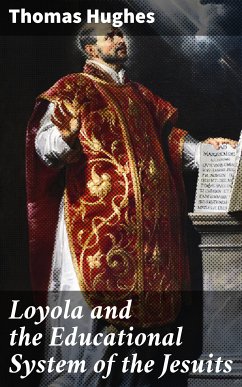
Outlines of Educational Doctrine (eBook, ePUB)
Enriched edition. Principles of Teaching: A Comprehensive Guide for Educators
Kommentar: Sterling, Noah / Redaktion: Good Press / Übersetzer: Lange, Alexis Frederick
Versandkostenfrei!
Sofort per Download lieferbar
1,99 €
inkl. MwSt.
Weitere Ausgaben:

PAYBACK Punkte
0 °P sammeln!
In "Outlines of Educational Doctrine," Johann Friedrich Herbart articulates a revolutionary framework for education that intertwines philosophy, psychology, and pedagogy. Herbart's literary style is marked by clarity and systematic exposition, reflecting the Enlightenment's emphasis on rational thought and moral development. This seminal work positions education not merely as vocational training but as a moral enterprise aimed at cultivating ethical citizens through a structured curriculum, proposing ideas that emphasize the interconnectedness of knowledge and the formative role of experience ...
In "Outlines of Educational Doctrine," Johann Friedrich Herbart articulates a revolutionary framework for education that intertwines philosophy, psychology, and pedagogy. Herbart's literary style is marked by clarity and systematic exposition, reflecting the Enlightenment's emphasis on rational thought and moral development. This seminal work positions education not merely as vocational training but as a moral enterprise aimed at cultivating ethical citizens through a structured curriculum, proposing ideas that emphasize the interconnectedness of knowledge and the formative role of experience in learning. Herbart's systematic approach to educational theory stands as a foundation for modern pedagogical practices, influencing educators and theorists alike. Johann Friedrich Herbart (1776-1841), a prominent German philosopher and educator, was a seminal figure in the development of educational psychology. His academic journey and philosophical inquiries, particularly into the nature of consciousness and moral development, led him to advocate for an educational system that fosters critical thinking and ethical reasoning. His work emerged during a period of significant educational reform in Europe, where the need for effective teaching methods and curricula became apparent due to broader sociocultural shifts. "Outlines of Educational Doctrine" is essential reading for educators, philosophers, and those interested in the evolution of educational thought. Herbart's insights remain relevant as they address the challenges of moral and intellectual education in contemporary society. Dive into this pivotal text to explore how education can shape not only individual minds but also society as a whole. In this enriched edition, we have carefully created added value for your reading experience: - A succinct Introduction situates the work's timeless appeal and themes. - The Synopsis outlines the central plot, highlighting key developments without spoiling critical twists. - A detailed Historical Context immerses you in the era's events and influences that shaped the writing. - A thorough Analysis dissects symbols, motifs, and character arcs to unearth underlying meanings. - Reflection questions prompt you to engage personally with the work's messages, connecting them to modern life. - Hand-picked Memorable Quotes shine a spotlight on moments of literary brilliance. - Interactive footnotes clarify unusual references, historical allusions, and archaic phrases for an effortless, more informed read.
Dieser Download kann aus rechtlichen Gründen nur mit Rechnungsadresse in A, B, BG, CY, CZ, D, DK, EW, E, FIN, F, GR, H, IRL, I, LT, L, LR, M, NL, PL, P, R, S, SLO, SK ausgeliefert werden.













